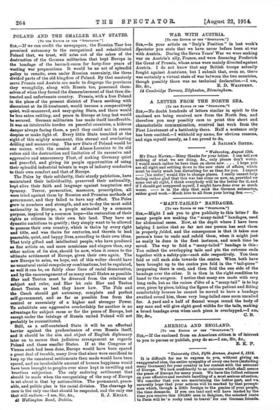POLAND AND THE SMALLER SLAV STATES.
[TO THE EDITOR OF THE " SPECTATOR."]
Stu.,—If we can credit the newspapers, the Russian Tsar has promised autonomy to the reorganized and rehabilitated Poland that, we trust, will arise out of the ashes of the destruction of the German militarism that kept Europe in the bondage of the barrack-room for forty-four years of wasting war preparations. It would be an act of splendid policy to reunite, even under Russian suzerainty, the three divided parts of the old kingdom of Poland. By that masterly move Prussia and Austria are made to disgorge the provinces they wrongfully, along with Russia too, possessed them- selves of when they forced the dismemberment of that then dis- tracted and unfortunate country. Prussia, with a free Poland in the place of the present district of Posen seething with discontent at its ill-treatment, would become a comparatively quiet, well-mannered, and easy-going State, and there would be less sabre rattling, and peace in Europe at long last would be secured. German militarism has made itself insufferable. It was an intolerable burden on peaceful countries, a hideous danger always facing them, a peril they could not in reason despise or make light of. Every little State trembled at the sight of this mighty armament, this eternal and everlasting drilling and manoeuvring. The new State of Poland would be one means, with the cession of Alsace-Lorraine to its old rulers and the destruction and limitation of its excessive and aggressive and unnecessary Fleet, of making Germany quiet and peaceful, and giving its people opportunities of using their splendid industrial talents in ways of industry conducive to their own comfort and that of Europe.
The Poles by their solidarity, their sturdy patriotism, have maintained their individuality, preserved their nationality, kept alive their faith and language against temptation and tyranny. Terror, persecution, massacre, proscription, all were tried against them by Russian and Prussian methods of government, and they failed to have any effect. The Poles grew in numbers and strength, and are to-day the most solid nationality in Europe, a people animated by a common purpose, inspired by a common hope—the restoration of their rights as citizens in their own fair land. They have no dynastic ambitions to gratify ; they simply want to be allowed to possess their own country, which is theirs by every right and title, and was theirs for centuries, and therein to lead peaceable, quiet, and happy lives, according to their own ideas. That truly gifted and intellectual people, who have produced as fine artists as, and more musicians and singers than, any other nation of its size, should be now, when it comes to the ultimate settlement of Europe, given their own again. The new Europe to arise, we hope, out of this welter should have no unnatural racial compulsory combinations, but be regulated, as well it can be, on fairly clear lines of racial demarcation, and by the encouragement of as many small States as possible. Slav and Teuton must be divorced from the relations of subject and ruler, and Slav let rule Slav and Teuton direct Teuton as best they know how. The Pole and the Czech should get autonomy, complete and perfect self-government, and as far as possible free from the control or suzerainty of a higher and stronger Power. To substitute one aggressive overlordship for another is no advantage for subject races or for the peace of Europe, but except under the tutelage of Russia united Poland will not probably be reconstituted.
Still, as a self-contained State it will be an effectual barrier against the predominance of even Russia itself, and it should be the aim and object of English diplomacy later on to secure that judicious arrangement as regards Poland and those smaller States. If at the Congress of -Vienna such had been done, Europe would have been spared a great deal of trouble, many lives that since were sacrificed to keep up the unnatural settlements then made would have been spared, and an incalculable amount of human happiness would have been brought to peoples ever since kept in unwilling and heartless subjection. The only enduring settlement that should be made when the reorganizing of the map of Europe is set about is that by nationalities. The permanent, peace- able, and politic plan is the racial division. The cleavage by race is the only one that should be respected, and the only one
that will endure.—I am, Sir, &c., R. J. KELLY. 45 Wellington Road, Dublin.


































 Previous page
Previous page